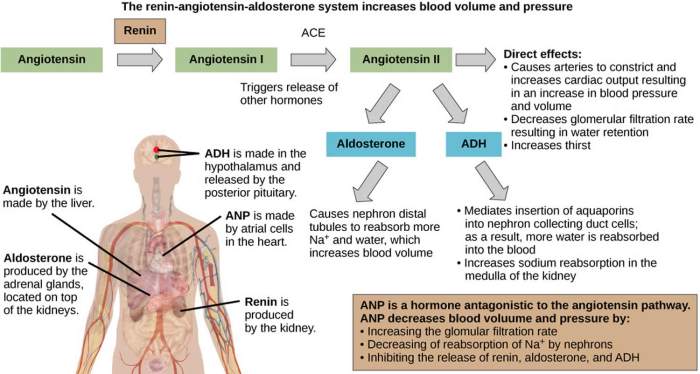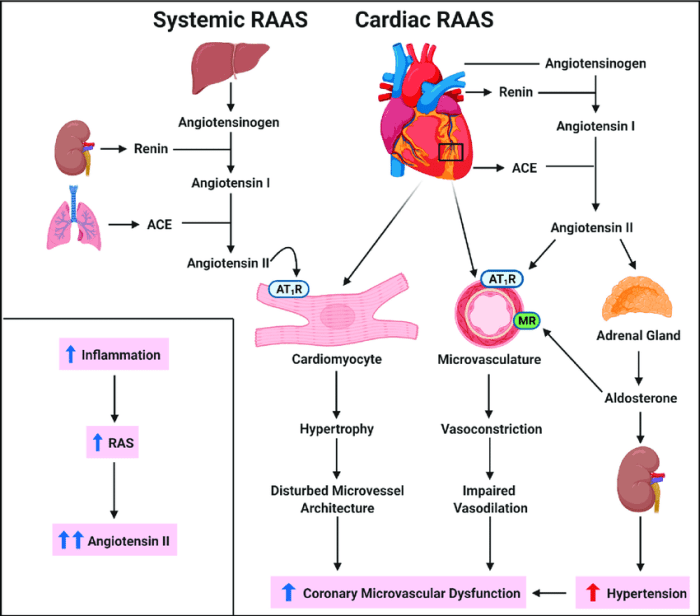How does progressive nephron injury affect angiotensin ii activity – Progressive nephron injury, a relentless assailant of kidney function, stands at the heart of this exploration. Its insidious effects are intimately intertwined with the enigmatic dance of angiotensin II (Ang II), a pivotal player in the intricate renin-angiotensin-aldosterone system. Together, they orchestrate a symphony of cellular responses that shape the fate of nephrons, the fundamental units of renal filtration.
This discourse embarks on a journey to unravel the intricate mechanisms by which Ang II orchestrates progressive nephron injury. We delve into its inflammatory machinations, its role as a master puppeteer of fibrosis, and its insidious contribution to the ominous specter of glomerulosclerosis.
By deciphering the molecular pathways that underpin these nefarious actions, we illuminate the path toward therapeutic interventions that can safeguard the delicate balance of renal function.
Progressive Nephron Injury and Angiotensin II Activity: An Overview: How Does Progressive Nephron Injury Affect Angiotensin Ii Activity

Progressive nephron injury refers to the gradual deterioration of functional nephrons, the microscopic units responsible for filtering waste products from the blood in the kidneys. This progressive loss of nephrons leads to a decline in kidney function and can eventually result in end-stage renal disease.
Angiotensin II (Ang II), a hormone produced by the renin-angiotensin-aldosterone system (RAAS), plays a significant role in the development and progression of nephron injury.The RAAS is a complex hormonal pathway that regulates blood pressure and fluid balance in the body.
Ang II, the primary effector molecule of the RAAS, exerts its effects by binding to specific receptors on target cells. In the kidneys, Ang II promotes vasoconstriction, leading to increased blood pressure in the glomerulus, the filtering unit of the nephron.
This increased pressure can damage the delicate glomerular capillaries, leading to proteinuria (the presence of protein in the urine) and a decline in kidney function.
Mechanisms of Ang II Activity in Progressive Nephron Injury
Ang II contributes to progressive nephron injury through several mechanisms:
-
-*Inflammation
Ang II stimulates the production of pro-inflammatory cytokines, which can lead to inflammation and damage to the kidney tissue.
-*Fibrosis
Ang II promotes the production of extracellular matrix proteins, leading to fibrosis and scarring of the kidney tissue.
-*Glomerulosclerosis
Ang II accelerates the hardening and scarring of the glomeruli, leading to a decline in kidney function.
Specific molecular pathways involved in Ang II-mediated nephron injury include the activation of the mitogen-activated protein kinase (MAPK) pathway, the transforming growth factor-beta (TGF-β) pathway, and the nuclear factor kappa-light-chain-enhancer of activated B cells (NF-κB) pathway. These pathways promote inflammation, fibrosis, and glomerulosclerosis, contributing to the progression of nephron injury.
Clinical Implications of Ang II Activity in Progressive Nephron Injury
The clinical implications of Ang II activity in progressive nephron injury are significant. Ang II inhibition has been shown to slow the progression of kidney disease and reduce the risk of end-stage renal disease. Therapeutic interventions targeting Ang II activity include:
Angiotensin-converting enzyme (ACE) inhibitors
These drugs block the conversion of angiotensin I to Ang II.
Angiotensin receptor blockers (ARBs)
These drugs block the binding of Ang II to its receptors.These interventions have been shown to reduce proteinuria, improve kidney function, and slow the progression of nephron injury in patients with chronic kidney disease.
Future Directions in Research on Ang II Activity and Progressive Nephron Injury, How does progressive nephron injury affect angiotensin ii activity
Further research is needed to fully elucidate the role of Ang II in progressive nephron injury. Potential future research directions include:
- Investigating the role of specific Ang II receptors in nephron injury.
- Developing novel therapeutic strategies targeting Ang II activity.
- Studying the effects of Ang II inhibition on the progression of kidney disease in different patient populations.
These research efforts will contribute to a better understanding of the mechanisms of Ang II-mediated nephron injury and the development of more effective therapeutic interventions for kidney disease.
Popular Questions
What are the key mechanisms by which Ang II contributes to progressive nephron injury?
Ang II exerts its detrimental effects through a multifaceted array of mechanisms, including inflammation, fibrosis, and glomerulosclerosis. It orchestrates a cascade of cellular events that culminate in the relentless deterioration of nephron function.
How does Ang II inhibition impact the progression of kidney disease?
Thwarting the actions of Ang II has proven to be a promising therapeutic strategy in combating the relentless progression of kidney disease. By employing drugs that effectively neutralize Ang II’s influence, we can mitigate the inflammatory storm, curb the relentless march of fibrosis, and safeguard the delicate architecture of glomeruli.
What are some potential future research directions in this field?
The future of this research domain holds immense promise. We eagerly anticipate the emergence of novel therapeutic interventions that can precisely target Ang II activity, offering a beacon of hope for patients battling kidney disease. Additionally, innovative approaches to unraveling the intricate mechanisms and far-reaching consequences of Ang II’s actions will undoubtedly lead to groundbreaking discoveries.

